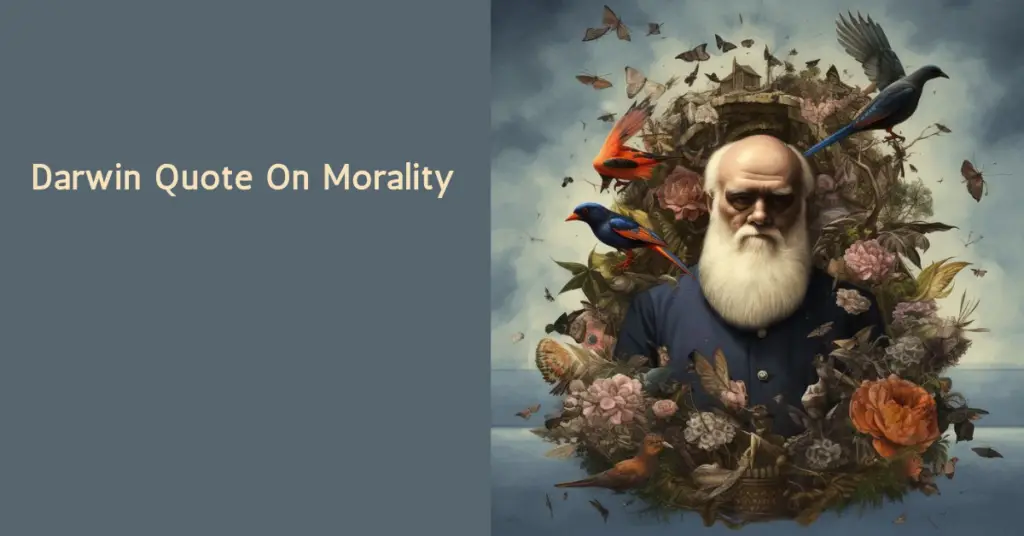Introduction:
“Morality is what makes us human.” This is the essence of the Darwin Quote On Morality, a thought-provoking reflection on humanity’s higher traits. Charles Darwin, the father of evolutionary theory, didn’t just focus on science. He explored human emotions, morality, and how they evolved. His ideas remind us that kindness and empathy have roots in survival. In this blog, we explore Darwin’s fascinating views on morality and their relevance today.
Darwin’s insights go beyond biology. His darwin theory quotes connect evolution with human values. Did morality grow from survival instincts? Darwin believed it did. He proposed that group survival required cooperation. His darwin quote on evolution supports this, stating that higher traits often serve the greater good.
What makes morality unique? Darwin thought emotions were key. His darwin’s theory philosophy explains how emotions like guilt or pride could drive moral choices. It’s intriguing to see morality as an evolutionary strategy, not just a cultural ideal.
We’ll also uncover how darwin quotes on natural selection touch on humanity’s social bonds. Why do humans care for the sick, or protect the weak? Darwin thought such behavior wasn’t accidental. It’s what sets us apart and brought us together over time.
Join us as we reflect on Darwin’s views, blending science and humanity through the lens of evolution. The Darwin Quote On Morality is just the beginning of an engaging exploration of what it truly means to be human.
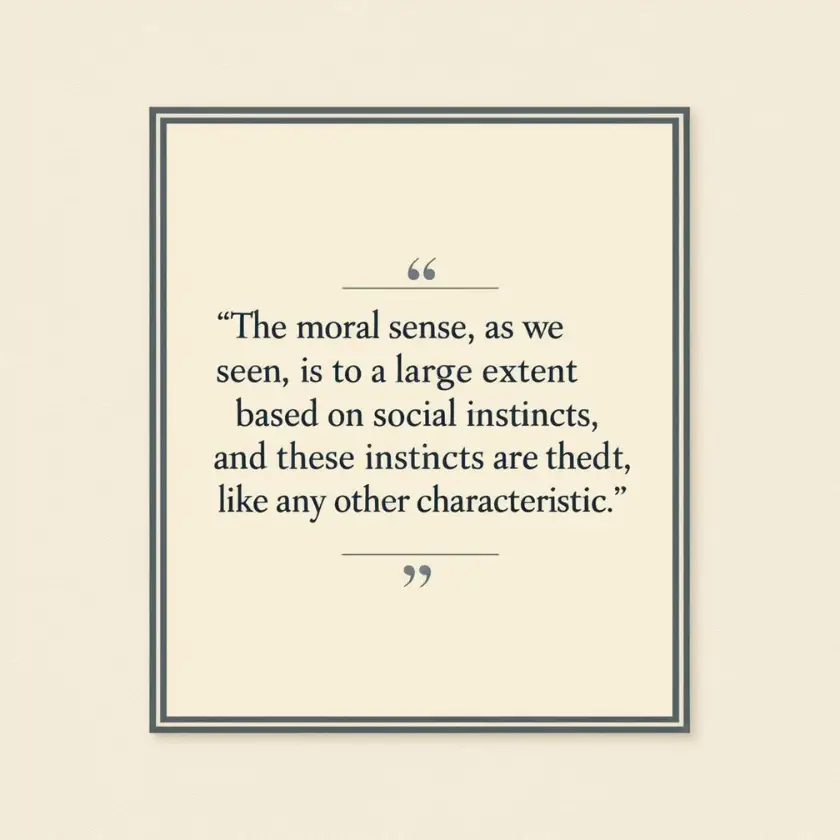
Darwin’s Views on Morality in the Context of Evolution
- “The moral sense, as we have seen, is to a large extent based on social instincts, and these instincts are inherited, like any other characteristic.”
In Darwin Quote On Morality, Darwin explains how morality has evolutionary roots, linking it to the development of social instincts that helped humans survive. These instincts, inherited over generations, are crucial to understanding human behavior. - “We must, however, bear in mind that natural selection has nothing to do with the moral aspects of actions.”
Darwin, in Darwin Quote On Morality, distinguishes between moral behavior and the process of natural selection. He suggests that while morality can aid survival, it is not directly shaped by the selective forces of evolution. - “Man is more moral than any other species because of his social nature, which has been fostered by natural selection.”
Darwin Quote On Morality highlights how humans have developed a more complex moral sense compared to other animals, thanks to the evolutionary benefits of living in cooperative groups. This societal bond is essential for human survival and morality. - “The sense of justice, as we now understand it, appears to be a product of our social instincts and our tendency to empathize with others.”
In Darwin Quote On Morality, Darwin discusses how the human capacity for empathy and justice has evolved, making moral behavior a byproduct of our instinctual social tendencies. These qualities have developed because they promote cooperation and social cohesion. - “The growth of human morality can be explained by the same evolutionary forces that drive the development of other traits in nature.”
Darwin’s perspective in Darwin Quote On Morality ties morality to evolutionary processes. Just as physical traits evolve over time, so too does our moral understanding, shaped by social and environmental factors over generations. - “Morality is not a divine gift, but an outcome of human evolution that has been reinforced by social and environmental pressures.”
Through Darwin Quote On Morality, Darwin challenges the traditional view that morality is a divine construct. Instead, he suggests that it is the result of evolution and is reinforced through social interactions and pressures over time. - “The capacity for moral behavior exists in all social animals, but it is most developed in humans due to our advanced social structure.”
In Darwin Quote On Morality, Darwin emphasizes that while social animals exhibit moral behavior, humans have evolved a more complex and sophisticated form of morality due to our intricate social systems. - “Social cooperation and altruism are vital aspects of human evolution, and they are deeply connected to our moral sense.”
As expressed in Darwin Quote On Morality, Darwin believes that cooperation and altruism, which are vital for survival, have played a significant role in the development of human morality, reinforcing moral behaviors within societies. - “Natural selection may favor moral instincts because they encourage social cohesion, which ultimately benefits survival.”
Darwin Quote On Morality explains how behaviors that promote social cooperation are favored by natural selection. These behaviors enhance group survival and, in turn, contribute to the development of moral instincts within humans. - “Our morality is a product of both genetic evolution and cultural evolution, working together to shape our behavior.”
Darwin’s view, as reflected in Darwin Quote On Morality, acknowledges that both our genetic makeup and cultural influences have shaped human morality. Evolution plays a central role in fostering the social behaviors that form the foundation of moral values. - “Morality can be seen as an adaptation that helps individuals live in harmony within society, which is essential for survival.”
In Darwin Quote On Morality, Darwin links morality directly to survival. As societies grow, moral values are key to maintaining harmony, and individuals who exhibit moral behavior are more likely to thrive in cooperative environments. - “While natural selection has molded our physical traits, it has also subtly shaped our moral instincts, guiding us toward social behavior.”
Darwin Quote On Morality suggests that natural selection plays a significant role not only in shaping physical traits but also in guiding moral instincts. These instincts help humans navigate complex social structures. - “Our sense of right and wrong is not innate but a product of evolution, developed through interactions within our social groups.”
Darwin argues, through Darwin Quote On Morality, that morality is not an inherent trait but rather something that evolves through social interactions. It is cultivated over generations to maintain peace and order within communities. - “Ethics are deeply connected to our survival instincts, which have been shaped by the same evolutionary pressures that govern our behavior.”
Darwin Quote On Morality ties ethical behavior directly to survival. As humans have evolved, ethical principles that promote cooperation and mutual benefit have become ingrained in our moral codes, influenced by the same forces that drive evolution. - “The development of morality in humans is intricately linked to the progression of social structures and the survival of our species.”
Darwin, in Darwin Quote On Morality, connects human morality to the development of complex societies. As human groups grew larger and more intricate, the need for moral rules and cooperation became more apparent for survival.
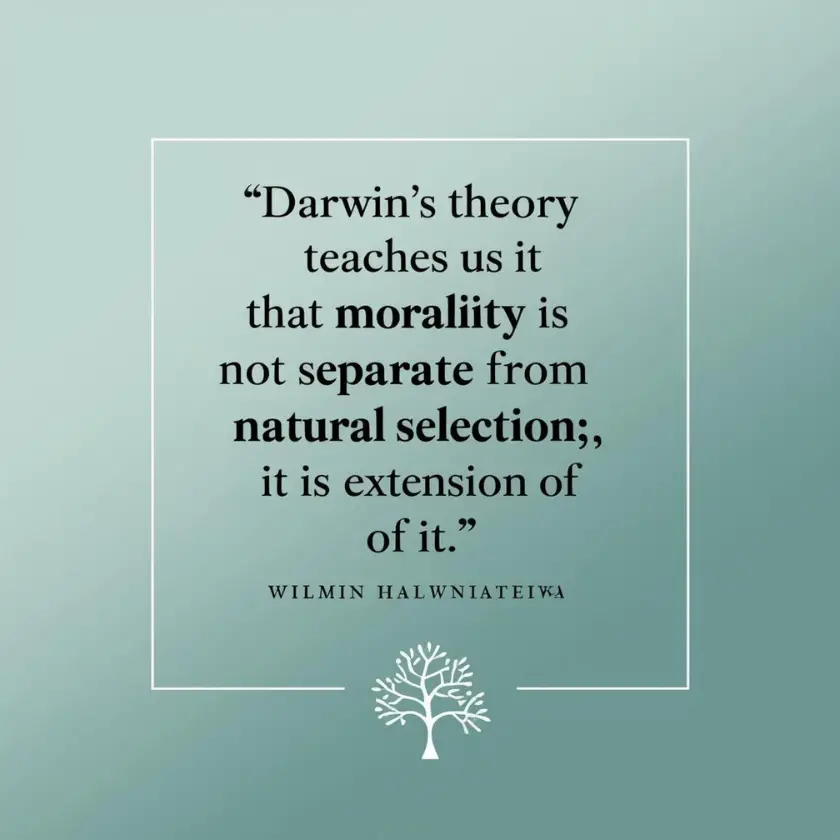
Darwin’s Philosophy of Evolution and Morality
- “Darwin’s theory teaches us that morality is not separate from natural selection; it is an extension of it.”
Darwin’s Theory Philosophy in Darwin’s work suggests that morality evolves alongside other traits, like intelligence and cooperation. It becomes a key factor in group survival, promoting behaviors that enhance the social fabric. - “The process of natural selection leads not only to the physical traits we see in organisms but also to the evolution of behaviors such as morality.”
As expressed in Darwin’s Theory Philosophy, Darwin believes that morality, like any other trait, is subject to evolutionary forces. The behaviors that increase an organism’s chances of survival are selected over time, including moral behaviors. - “Moral behavior in humans is ultimately shaped by the same natural forces that affect all aspects of life.”
Darwin’s perspective, in Darwin’s Theory Philosophy, suggests that moral behavior is not an isolated phenomenon but one that evolves as part of the larger web of natural selection. This interconnectedness helps explain how moral traits developed over time. - “Natural selection favors behaviors that benefit the group, and morality is one of the key behaviors that promotes group survival.”
Darwin’s Theory Philosophy asserts that behaviors promoting cooperation and group cohesion are selected because they enhance the survival of the species. Morality, as part of this, helps maintain harmony within groups, facilitating their success. - “The survival of the fittest does not apply only to physical traits but extends to behaviors that enhance the collective welfare.”
Darwin’s Theory Philosophy reflects Darwin’s belief that moral traits, which promote collective well-being, are selected just like any other physical trait. These behaviors ensure that individuals and societies thrive. - “The development of morality can be seen as an adaptation that has been honed by natural selection to ensure social stability.”
As outlined in Darwin’s Theory Philosophy, Darwin argues that moral instincts evolved because they contributed to the stability and success of human societies, ultimately benefiting the survival of the species. - “Human morality is not a gift, but a result of evolution that fosters social cooperation and promotes the welfare of the group.”
In Darwin’s Theory Philosophy, Darwin challenges the idea of morality as a divine gift, instead suggesting that it is a natural outcome of evolutionary pressures that encourage cooperation for survival. - “Moral instincts, like all traits, have evolved because they increase the chances of survival for individuals within a group.”
Darwin’s Theory Philosophy emphasizes the evolutionary basis of morality, explaining that moral instincts have been selected over time because they help individuals navigate social interactions, thereby enhancing the survival of the group. - “The moral sense in humans has evolved as a social adaptation, enabling us to live harmoniously within larger, complex societies.”
As Darwin explains in Darwin’s Theory Philosophy, morality has evolved as a tool to help humans maintain peace and cooperation within increasingly complex societies, thereby promoting survival. - “Morality, like other aspects of human nature, is shaped by evolutionary pressures that favor behaviors that enhance social cohesion.”
Darwin’s Theory Philosophy shows how morality is just another trait shaped by evolution, promoting behaviors that strengthen social bonds and ensure group survival. - “Natural selection has favored the development of moral feelings that encourage group cohesion and cooperation.”
Darwin’s Theory Philosophy highlights how moral feelings, which enhance cooperation and group cohesion, have been favored in the evolutionary process, leading to the development of our current moral frameworks. - “The evolution of moral behavior in humans is intertwined with our evolutionary history, shaped by both nature and nurture.”
Darwin’s Theory Philosophy acknowledges that while morality has evolved through natural selection, it is also influenced by cultural and social factors that shape human behavior over time. - “Humans, through evolution, have developed a moral sense because it contributes to the survival and well-being of the species.”
Darwin explains in Darwin’s Theory Philosophy how human morality evolved as a practical adaptation, benefiting social groups and increasing the likelihood of survival and prosperity. - “Our moral instincts have been honed by evolutionary pressures, helping us thrive in social environments and ensure our survival.”
Darwin’s Theory Philosophy ties morality directly to evolutionary pressures, demonstrating how behaviors promoting social cohesion are selected over time because they enhance the survival of individuals and groups.
Darwin’s Influence on Modern Understanding of Morality
- “The moral sense in humans is not innate, but has evolved over time, influenced by the need for cooperation within society.”
Darwin Quote On Morality reflects Darwin’s belief that morality is not a divine or pre-programmed trait, but rather something that has evolved because it is beneficial for group cooperation and survival. This understanding continues to shape modern perspectives on human morality. - “Morality is a complex result of both genetic inheritance and social learning, both of which are shaped by evolutionary forces.”
As Darwin suggests in Darwin Quote On Morality, human morality has developed through both genetic inheritance and social learning. Over time, these combined factors have shaped human behavior, ensuring that moral instincts foster cooperation and group survival. - “The theory of natural selection applies not only to physical traits but also to psychological traits such as empathy and moral reasoning.”
Darwin, through Darwin Quote On Morality, emphasizes how psychological traits, including empathy and moral reasoning, have evolved alongside physical traits. These traits have proven beneficial for survival, as they enhance cooperation within social groups. - “We are moral beings because our ancestors who cooperated and adhered to social rules survived more successfully.”
Darwin Quote On Morality aligns with Darwin’s argument that morality has evolved as a result of natural selection. Those who followed social rules and cooperated within groups were more likely to thrive, passing down these behaviors. - “Human morality is not static but evolves as societies change and new challenges arise.”
Darwin’s perspective in Darwin Quote On Morality highlights that morality is not fixed but adaptive. As human societies have evolved, so too has morality, adjusting to new social and environmental conditions to ensure continued survival. - “Natural selection has molded human morality, favoring behaviors that promote group cohesion and enhance survival.”
Darwin’s belief in Darwin Quote On Morality is that moral behaviors, which promote the welfare of the group, have been selected over time. Cooperation, empathy, and justice all contribute to the survival of societies, making them central to human evolution. - “Altruism, as part of moral behavior, has evolved because it benefits the group and ensures mutual survival.”
In Darwin Quote On Morality, Darwin discusses how altruistic behaviors—selfless acts for the benefit of others—have evolved through natural selection because they enhance group cohesion and increase the likelihood of survival for all members of the group. - “Morality is shaped by both biological imperatives and the need for cooperation within increasingly complex social structures.”
Darwin Quote On Morality reflects Darwin’s understanding that morality evolves in response to both biological and social needs. As human societies grow more complex, moral instincts are honed to promote cooperation and social stability. - “The foundation of human morality lies in social instincts, which evolved to foster cooperation and mutual aid.”
Darwin Quote On Morality emphasizes that morality is deeply rooted in our social instincts, which evolved as humans began to form groups. These instincts encouraged behaviors such as cooperation and mutual aid, ensuring the survival of individuals within a group. - “Human morality, unlike the instincts of animals, is guided by complex reasoning and societal norms that have evolved through generations.”
Darwin Quote On Morality notes that, while animals have moral-like behaviors, human morality is distinct in its complexity. It is guided by reason and societal norms that have evolved over time to help manage increasingly complex social structures. - “Morality helps regulate human interactions, ensuring that individuals live in harmony and that the group thrives.”
Darwin’s explanation in Darwin Quote On Morality shows that morality is crucial for maintaining order within societies. It regulates interactions and promotes behaviors that allow individuals to live together harmoniously, increasing the group’s chances of survival. - “The evolution of moral behavior is driven by the need to create stable, cooperative societies that benefit all members.”
Darwin Quote On Morality indicates that the primary driver behind the evolution of morality is the need for stable, cooperative societies. Moral behavior ensures that individuals contribute positively to the welfare of the group, facilitating mutual survival. - “Moral behaviors are behaviors that have been selected because they support social cooperation and collective survival.”
Darwin Quote On Morality ties morality directly to survival, asserting that moral behaviors are those that have been selected because they promote cooperation and enhance group stability, ensuring that individuals within a society thrive together. - “The development of morality, while partly biological, is also heavily influenced by cultural evolution and the needs of society.”
Darwin Quote On Morality underscores that morality is influenced not just by natural selection but also by cultural evolution. As societies evolve, so too does the understanding of right and wrong, further enhancing cooperation and survival.
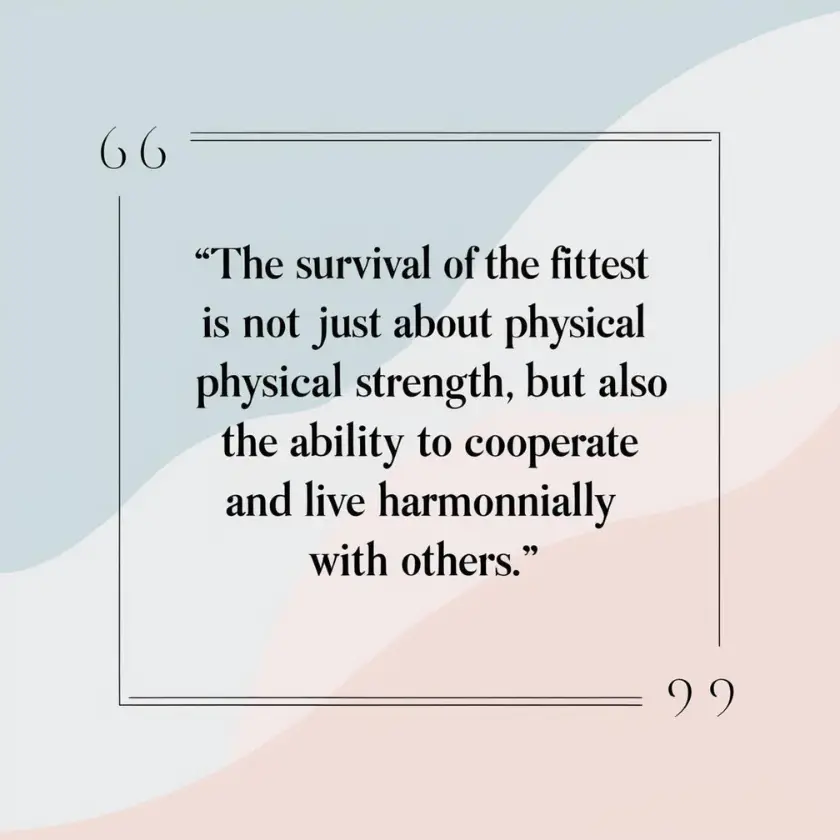
Darwin’s Legacy in Understanding the Evolution of Morality
- “The moral sense in humans can be traced to evolutionary origins, shaped by natural selection to benefit both the individual and society.”
Darwin Quote On Morality illustrates that human morality has its roots in evolution. These instincts have developed over time to support the survival of both individuals and societies, ensuring that moral behaviors align with the needs of the group. - “Natural selection has not only shaped our physical traits but also our moral instincts, guiding us toward behaviors that favor cooperation and altruism.”
Through Darwin Quote On Morality, Darwin emphasizes that morality is just another trait shaped by the same evolutionary forces that guide physical development. The development of moral instincts has been essential for the survival of human societies. - “The survival of the fittest is not just about physical strength, but also about the ability to cooperate and live harmoniously with others.”
Darwin’s interpretation in Darwin Quote On Morality suggests that morality is integral to the idea of survival. The ability to cooperate and work together has been crucial for the success of human groups, proving that moral behaviors are advantageous for survival. - “Natural selection has favored the development of moral instincts because they enhance the stability and success of social groups.”
Darwin Quote On Morality highlights that moral behaviors, which enhance social stability, have been favored by natural selection. These behaviors help ensure that societies are more likely to survive and thrive over time. - “Human morality has evolved to ensure that we can live together in peace, supporting one another for mutual benefit.”
In Darwin Quote On Morality, Darwin reflects on how morality evolved to ensure that humans can live together peacefully. Social cooperation, which morality promotes, is essential for mutual survival and success.
The Role of Natural Selection in Shaping Moral Instincts
- “Natural selection has shaped moral instincts that favor group survival over individual desires, ensuring that cooperation prevails over competition.”
Darwin Quote On Morality suggests that morality evolved because it supports group survival. Natural selection has favored behaviors that encourage cooperation, benefiting the group as a whole even when individual desires may conflict with the greater good. - “Moral behavior evolves because it promotes harmony within groups, increasing the chances of survival and the prosperity of all members.”
Darwin Quote On Morality demonstrates how moral behaviors are not solely for individual benefit but are rooted in the success of the group. Behaviors like cooperation and mutual aid, promoted by morality, are essential for the survival of groups over time. - “Cooperative behaviors, like empathy and fairness, have been naturally selected because they enhance social cohesion and increase the overall fitness of the group.”
Through Darwin Quote On Morality, Darwin points out that behaviors such as empathy and fairness, which are seen as moral traits, have been selected because they help the group function effectively and ensure its survival, making them advantageous from an evolutionary perspective. - “The foundation of human morality lies in our ability to care for others, which is a byproduct of natural selection favoring cooperation.”
Darwin Quote On Morality illustrates that our moral instincts, particularly our capacity for empathy, are not arbitrary but have evolved because they foster social bonds that ultimately support the survival of the group. - “Natural selection has favored behaviors that promote harmony, as these are essential for survival in social species like humans.”
In Darwin Quote On Morality, Darwin suggests that morality is a result of natural selection because it promotes harmony within social groups. Those who adhered to moral behaviors that facilitated cooperation were more likely to survive and pass on their traits. - “The moral sense is a product of natural selection, where those who cooperated and acted in the interest of the group were more likely to survive.”
Darwin Quote On Morality underscores that morality, which helps regulate human behavior, evolved because it facilitated group cooperation. Individuals who displayed moral behaviors that benefited the group contributed to the group’s survival. - “Empathy, kindness, and fairness are traits that have evolved because they increase the chances of survival for individuals within a cooperative society.”
Darwin Quote On Morality reveals that moral traits like empathy, kindness, and fairness were selected because they enhance the cohesiveness of the group. As a result, they support the survival of all members in a socially cooperative environment. - “Natural selection favors moral traits that ensure individuals work together for the collective good, improving the chances of survival for the entire group.”
Darwin’s perspective in Darwin Quote On Morality reflects that natural selection does not only favor physical traits but also moral ones that ensure people collaborate and prioritize the collective good. This cooperation increases group survival. - “The evolution of morality, particularly altruism, is key to understanding the human drive to help others and cooperate for the benefit of society.”
Darwin Quote On Morality emphasizes the role of altruism in morality, noting that it evolved because it was beneficial for the group’s survival. The human inclination to help others and act in the collective interest is rooted in evolutionary history. - “Human morality, which governs how we treat others, has been shaped by the evolutionary pressures of natural selection to ensure the survival of the group.”
In Darwin Quote On Morality, Darwin draws a direct connection between human morality and natural selection, noting that moral behaviors, which prioritize the well-being of others, have evolved to ensure the survival and prosperity of the group.
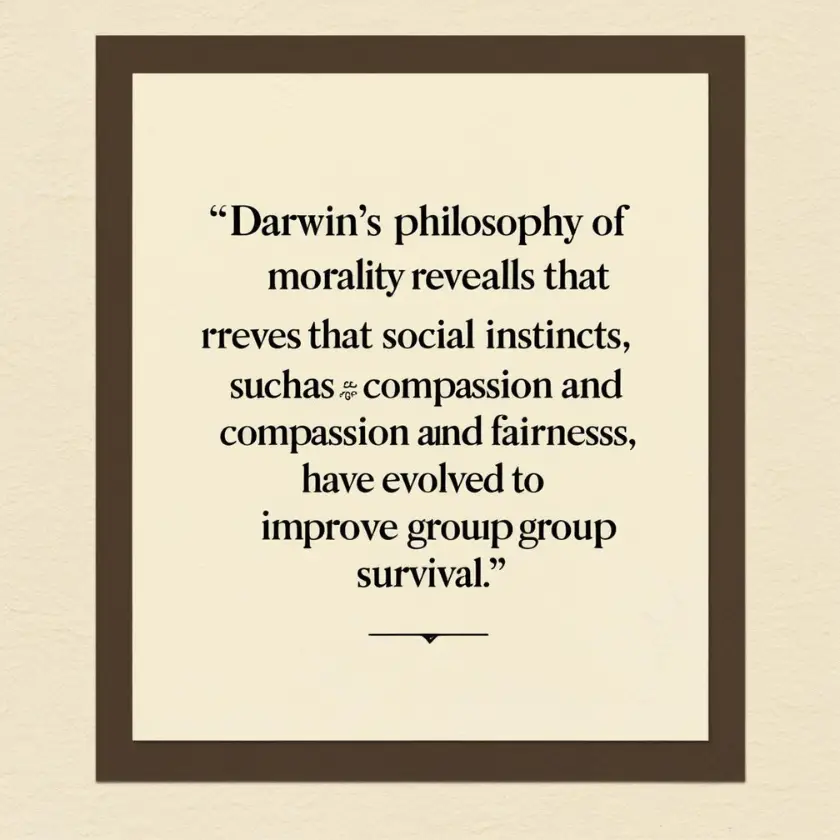
The Philosophy Behind Darwin’s View on Morality
- “Darwin’s theory suggests that moral values are not absolute but evolve with the needs of society and the environment.”
Darwin Quote On Morality implies that morality is not fixed but adaptable, evolving with society’s changing needs and the environmental context. Moral values change as groups grow and face new challenges, a principle that aligns with Darwin’s broader evolutionary philosophy. - “Moral behavior is driven by the same principles as physical traits: those that enhance survival are passed down through generations.”
In Darwin Quote On Morality, Darwin suggests that moral behaviors, much like physical traits, are shaped by natural selection. Behaviors that promote survival, cooperation, and group welfare are favored and passed down through generations. - “Darwin’s philosophy of morality reveals that social instincts, such as compassion and fairness, have evolved to improve group survival.”
Darwin Quote On Morality explains how Darwin viewed morality as a product of evolution. Social instincts like compassion and fairness evolved because they helped groups thrive by encouraging cooperation and reducing conflict. - “The evolution of moral instincts is as fundamental to human survival as the evolution of physical traits.”
Darwin Quote On Morality reinforces Darwin’s argument that morality, as an evolutionary trait, is just as important as physical traits. Both have evolved to ensure human survival and the success of groups. - “Morality is shaped by the need for social cooperation, and natural selection rewards behaviors that help groups work together effectively.”
Darwin’s argument in Darwin Quote On Morality is that natural selection has shaped moral behavior to ensure cooperation. Behaviors that help groups work together effectively are favored because they increase the likelihood of survival. - “The evolution of morality demonstrates how human behavior is shaped by both biological imperatives and social contexts.”
In Darwin Quote On Morality, Darwin explores how human behavior is influenced not only by biological factors like natural selection but also by social contexts that demand cooperation and ethical behavior for group survival. - “Moral instincts, according to Darwin, are deeply ingrained in human nature and have evolved to promote societal well-being.”
Darwin Quote On Morality shows Darwin’s belief that moral instincts are natural and have evolved to benefit society. These instincts help maintain social order, which is critical for the survival of the community. - “Darwin saw morality as part of the complex interplay between biology, psychology, and society, evolving to ensure human cooperation.”
Darwin Quote On Morality suggests that Darwin viewed morality as a multifaceted trait, shaped by the interaction of biological instincts, psychological development, and societal needs. - “According to Darwin, moral behaviors that promote social cooperation have a distinct evolutionary advantage over those that do not.”
Darwin Quote On Morality explains how Darwin’s theory of evolution favors moral behaviors that promote cooperation. These behaviors are vital for the survival of social species like humans, giving them an evolutionary edge.
Natural Selection and the Evolution of Moral Behavior
- “In the same way natural selection has shaped our physical traits, it has also molded our moral instincts to favor cooperation.”
Darwin Quote On Morality reflects Darwin’s understanding that natural selection did not only work on physical characteristics but also on moral behaviors. Behaviors that promote collaboration and altruism are naturally selected because they ensure group survival, which ultimately supports the evolutionary success of individuals within the group. - “Moral behaviors such as helping others or acting fairly are not merely cultural constructs but evolutionary strategies that enhance survival.”
Darwin Quote On Morality shows that Darwin believed moral behaviors, like fairness and helping others, evolved due to their survival benefits. Helping behaviors, rather than being arbitrary, have clear evolutionary advantages in social species, making them more likely to be passed on. - “The moral sense, according to Darwin, is a product of natural selection, honed by the needs of social life and group survival.”
Darwin Quote On Morality explains Darwin’s theory that morality is shaped by natural selection. He believed that moral senses—such as empathy, justice, and altruism—were honed because they supported social cooperation, which is key to survival in a group. - “Our moral sense, including feelings of empathy, justice, and altruism, has evolved because it contributes to the cohesion of human societies.”
Darwin Quote On Morality suggests that traits like empathy and fairness evolved because they were vital for social cohesion. Humans who acted in ways that benefited the group were more likely to survive, and thus these moral instincts were passed down. - “Altruistic behaviors, like sharing resources or protecting the vulnerable, have an evolutionary advantage, reinforcing the moral instincts in humans.”
Darwin Quote On Morality illustrates Darwin’s argument that altruism evolved because it helped groups survive. Acts of kindness and protection, which are considered moral behaviors, strengthen group bonds and ensure that all members can thrive. - “Natural selection favors moral behaviors because they help ensure the survival and prosperity of the group, which increases the chances of individual success.”
Darwin Quote On Morality reinforces that morality plays a key role in group survival. Behaviors that support group well-being, such as cooperation and self-sacrifice, ultimately lead to the success of individuals within that group, highlighting the evolutionary benefit of morality. - “In societies where individuals display moral behavior, cooperation becomes more efficient, leading to better chances of survival and reproduction.”
Darwin Quote On Morality emphasizes that moral behaviors, which enhance cooperation, are selected because they improve the overall functioning of the group. Efficient cooperation is crucial for survival in social species, giving individuals a higher chance of success and reproduction. - “Moral actions like reciprocity, fairness, and empathy have evolved to help humans live harmoniously in complex social structures.”
According to Darwin Quote On Morality, behaviors such as fairness and empathy were selected because they enabled humans to live together in complex societies. These traits help foster harmonious relationships, which are essential for the stability of the group. - “Natural selection does not only favor physical strength but also moral strength—those who cooperate and work for the collective good tend to survive.”
In Darwin Quote On Morality, Darwin illustrates that moral strength, such as the ability to cooperate and contribute to the well-being of the group, is just as important for survival as physical strength. These moral traits help build trust and solidarity, which are essential in any successful social structure. - “Natural selection has crafted our moral instincts, ensuring that we prioritize group welfare over selfish interests to maximize survival.”
Darwin Quote On Morality highlights Darwin’s perspective that natural selection has shaped moral behavior to favor group welfare. By prioritizing the well-being of the group over individual desires, moral instincts help ensure the long-term survival of the group.
Philosophical Underpinnings of Darwin’s Views on Morality
- “Darwin’s evolutionary philosophy reveals that moral behavior is deeply rooted in our biological inheritance and has evolved to help us live in social harmony.”
Darwin Quote On Morality emphasizes that Darwin’s philosophy views morality as an inherited trait, shaped by natural selection to help humans live together harmoniously in societies. - “Moral instincts, according to Darwin, are not universal but have evolved in different ways depending on the social structures in which they developed.”
Darwin Quote On Morality reflects Darwin’s belief that morality is shaped by the environment and social context in which it exists. Different societies may have different moral norms based on their unique survival needs. - “In Darwin’s view, morality is an evolved trait that benefits not just individuals but entire societies, making them more adaptable and cohesive.”
Darwin Quote On Morality underscores Darwin’s view that morality was favored by natural selection because it improved the survival of the group as a whole. Morality facilitates group cooperation and makes societies more resilient and cohesive. - “The evolution of moral behaviors is essential to understanding how humans can cooperate, form bonds, and build societies that endure.”
Darwin Quote On Morality stresses the importance of moral behavior in human evolution. These behaviors, which promote cooperation and social bonding, are key to the survival of human societies. - “Darwin believed that our capacity for moral behavior is not a product of civilization but a result of evolutionary processes that promote social harmony.”
Darwin Quote On Morality shows Darwin’s belief that morality did not emerge with civilization but evolved earlier, as it was necessary for survival in social environments. Morality ensures group cooperation, which is vital for survival. - “Darwin’s perspective on morality highlights the interplay between biology and society, where moral instincts support survival by fostering cooperation and trust.”
Darwin Quote On Morality reveals Darwin’s belief in the connection between biology and morality. Moral instincts were shaped by the evolutionary need for cooperation and trust, essential for group survival. - “Darwin’s philosophy of morality is rooted in his view that survival is not just about competition but about the mutual aid and cooperation of individuals.”
Darwin Quote On Morality aligns with Darwin’s broader philosophy that cooperation and mutual aid are central to survival. While natural selection is often associated with competition, Darwin recognized that collaboration also plays a crucial role in the success of species. - “Moral evolution, according to Darwin, illustrates the deep connection between human nature and the social structures that define our lives.”
Darwin Quote On Morality emphasizes Darwin’s belief that moral evolution is integral to understanding human nature. Moral behaviors evolve to fit the social structures humans live in, helping these structures endure. - “Darwin’s exploration of moral instincts provides a foundational understanding of how societies form and the biological mechanisms that make cooperation possible.”
Darwin Quote On Morality underscores Darwin’s contributions to the understanding of morality as a biological and social phenomenon. His exploration reveals how moral instincts support the creation and stability of societies.

